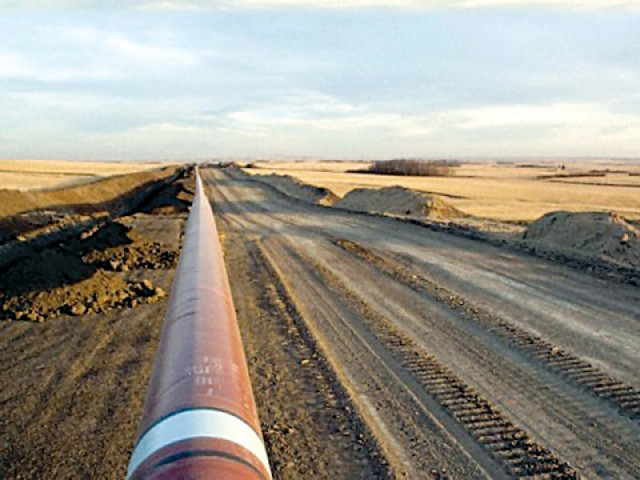Gas pipelines necessary to save economy from collapse
Offshore, TAPI pipelines will not only bring gas, but will also open markets

Turkmenistan-Afghanistan-Pakistan-India (TAPI) Gas Pipeline. PHOTO: FILE
Gas does not meet the entire energy requirement of many countries, but these nations and others still rely on each other for gas supply and are compelled to cooperate.
So, gas provides an energy alternative for the countries that are dependent on oil only.
Pakistan is one such country which once heavily banked on oil to satisfy its energy appetite, but started gas imports during the tenure of previous Pakistan Muslim League-Nawaz (PML-N) government.
For decades, Saudi Arabia is considered to have influenced Pakistan’s foreign policy in return for providing Islamabad with vital oil supplies. After the current Pakistan Tehreek-e-Insaf (PTI) government took the reins of power, Prime Minister Imran Khan too visited Riyadh, which tried to use oil diplomacy to keep Pakistan away from Iran.
Soon after the premier’s visit, Saudi authorities rushed to Pakistan where they offered investment in an oil refinery and oil supply on an extended credit facility.
In order to avert external influence, Pakistan should go for other fuel sources and learn from the experiences of European countries which have switched to alternative energy resources.
Russia, an oil and gas-rich country, has been supplying gas to Europe since long despite fierce opposition from the United States. Now, it is working on a new gas pipeline through the Baltic Sea and has got the backing of European economic power Germany.
European countries have dismissed the US opposition, arguing that they need gas to feed their economies and Russia is a big supplier.
US President Donald Trump has made a verbal assault on Germany for supporting the Baltic Sea pipeline deal with Russia, believing Berlin would become a “captive of Russia”. Trump was of the view that Germany would be paying billions of dollars to Russia for the gas purchase.
Pakistan is also working on different pipeline projects like the Iran-Pakistan (IP), Turkmenistan-Afghanistan-Pakistan-India (Tapi) and offshore gas pipelines. Washington supports only the Tapi project and is opposed to the IP and Russia’s offshore gas pipeline as Tehran and Moscow are its arch-rivals.
In such a situation, what options does Pakistan have? The new government has immediately signed its first energy deal worth billions of dollars with Russia for conducting a feasibility study on building the offshore gas pipeline.
Pakistan must not abandon the offshore and Tapi projects as they will not only meet its growing energy demand, but they also carry geopolitical importance and will lead to the opening of markets of these countries for Pakistani commodities.
This is quite important as Pakistan’s exports have remained almost stagnant over the past five years at around $24 billion. For this, the lack of diversification of export destinations has been blamed and rightly so.
Away from the Middle East, these energy projects can, no doubt, help address current economic challenges and strengthen Pakistan’s position in the region by undermining the role of Gulf oil suppliers in its affairs.
The Tapi project will bring up to 20% extra supply of natural gas. Time is running out, so Pakistan should take quick decisions to execute the project. Otherwise, it may have to suffer the cost of delay and the gas from Turkmenistan can be diverted to China and European markets.
Afghanistan has also a critical role to play in this project. The pipeline will reach Pakistan after snaking through Afghanistan, which will have to ensure security of the infrastructure.
Energy security
Pakistan should have multiple choices for gas import in order to achieve national energy security. Earlier, it wanted to implement the IP pipeline project, but caved in to the US pressure, which imposed sanctions on Iran for its alleged nuclear programme.
In place of IP, the US forced Pakistan to import liquefied natural gas (LNG) from Qatar where US and EU companies had major stakes. In the present situation, Pakistan still seems dependent on Washington in meeting its energy needs.
At present, Pakistan is producing about 4,170 million cubic feet of gas per day (mmcfd), but the output is expected to drop to about 2,260 mmcfd by 2021 as existing gas reserves are depleting fast.
Meanwhile, consumer demand is estimated at 5,395 mmcfd – about 29% higher than current supplies – and is projected to rise past 8,000 mmcfd by 2021.
In the face of domestic gas shortage, compressed natural gas (CNG) outlets, industrial units and textile manufacturers had faced the worst energy shortfall since 2008. After the start of LNG imports in March 2015, they have been able to meet their gas needs. Domestically produced gas only caters to the requirement of domestic consumers.
The China-Pakistan Economic Corridor (CPEC) is now entering its industrial phase under which several industrial units will be set up in the Special Economic Zones along the CPEC route. These units will need energy supplies which can be provided through Tapi and offshore pipeline projects. An industrial revolution in the country will also help ramp up exports.
The PTI government should take a bold decision like the way EU did in the case of gas imports from Russia to boost the bloc’s economy despite US resistance. The economy will collapse if the country’s interest is compromised by allowing other countries to interfere in its affairs.
The writer is a staff correspondent.
Published in The Express Tribune, October 15th, 2018.
Like Business on Facebook, follow @TribuneBiz on Twitter to stay informed and join in the conversation.


















COMMENTS
Comments are moderated and generally will be posted if they are on-topic and not abusive.
For more information, please see our Comments FAQ